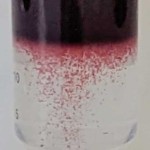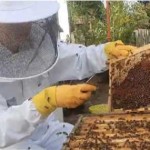

Understanding disease spread
Research theme aim: to focus on barriers to transmission and the effect of environmental changes on the spread of vectors and the exposure of animals and humans to novel pathogens.
Exemplar project: Emerging tick-borne viruses: Unravelling infection mechanisms in host and tick cells.
Research projects and students

Interferon Restriction of Poxviruses via Interferon Inducible Transmembrane Proteins (IFITM)
Hannah Ashby
Supervising institutes: University of Surrey; Defence Science and Technology Laboratory (Dstl)
About Hannah
What do you enjoy most about your PhD?
I really enjoy having the freedom to plan my own experiments and my workload. I also like the fact that the research is always linear with one question. As the project progresses there are new questions based on findings and the project can evolve into something different.
Could you share details of the journey that led to your PhD, including any experiences (professional, personal or educational) that have helped shape that path?
I did my undergraduate degree in Veterinary Biosciences here at Surrey where I wrote a research grant proposal for my final year project. This was a great opportunity to learn how research is conducted and how questions and experiments are designed. Outside of education, I have always loved sports and exercise. Many of the characteristics that help me to balance my training with other commitments have also helped me during my PhD.
Supervisors
- Professor Carlos Maluquer de Motes (University of Surrey)
- Professor Gill Elliott (University of Surrey)

Understanding transmission pathways of European Bat Lyssavirus 1 (rabies) to inform control strategies
Alice de Sampiano Kalkuhl
Supervising institutes: University of Sussex; Animal and Plant Health Agency (APHA)
About Alice
What do you enjoy most about your PhD?
I really like the intersection between fieldwork, lab work, mathematical modelling, and policy recommendations. The project takes a very detailed approach towards combining population dynamics, disease ecology, transmission modelling, and public health. I also find, there is a bit of a mystery solving aspect to how EBLV-1 got into serotines in the UK in the first place that I'm really excited to investigate.
Could you share details of the journey that led to your PhD, including any experiences (professional, personal or educational) that have helped shape that path?
I'm a Geneticist (B.Sc. University of Manchester and M.Sc. Trinity College Dublin) and Epidemiologist (M.Sc. University of Antwerp) by training. My expertise lies in modelling disease transmission and outbreak control as well as in the paleoepidemiology of viruses. Combined with my fieldwork experience with bats through conservation volunteering in Germany and Belgium, I became interested in how population dynamics and disease mechanisms interact with transmission dynamics in pathogen carrying bats. I have always taken One Health approaches to disease research and I'm really happy that it brought me to the Wessex One Health Doctoral Landscape Programme, the APHA, and the University of Sussex.
What is your project about?
EBLV-1 is primarily carried by serotine bats and was first identified in the UK in 2018. The aim of my project is to provide perspectives for control policies by using mathematical models of disease transmission and an investigation of population dynamics, in order to better understand how the virus became maintained in serotine populations and what this means for future preparedness and conservation efforts.
Supervisors
- Professor Fiona Mathews (University of Sussex)
- Professor Pierre Nouvellet (University of Sussex)
- Professor Dan Horton (APHA, The University of Surrey)

Emerging tick-borne viruses: Unravelling Infection Mechanisms in host and tick cells
Harry Taylor
Supervising institutes: University of Surrey; Defence Science and Technology Laboratory (Dstl)
About Harry
What do you enjoy most about your PhD?
What I love most about my PhD is having the freedom to drive my own discoveries piecing together how viruses interact with their hosts and uncovering new insights with every experiment. I get to mix lab work with bioinformatics, which keeps things interesting, and there's something really satisfying about seeing my data come together. I also enjoy the problem-solving aspects when things don't work, it's a challenge to figure out why! Plus, being part of a research community, sharing ideas, and learning from others makes the journey very rewarding.
Could you share details of the journey that led to your PhD, including any experiences (professional, personal or educational) that have helped shape that path?
After earning my BSc in Microbiology, I was eager to work with viruses but unsure in what capacity. To gain hands-on experience, I worked in industry, moving across sectors from Dstl to APHA and later Liphook Equine Hospital, mainly focusing on diagnostics. However, I realised that diagnostic work wasn't my passion and I wanted to conduct my own research and contribute to new discoveries. This led me to explore PhD opportunities. My interest in haemorrhagic fevers began when I first learned about Ebola, and I've always been drawn to highly virulent viruses. Understanding how these pathogens hijack cells to drive disease fascinated me, ultimately leading me to pursue a PhD in this field.
Supervisors
- Dr Marine J. Petit (University of Surrey)
- Dr Yashwanth Subbannayya (University of Surrey)
- Dr Sophie Smither (Dstl)
- Dr Steve Lever (Dstl)
Monkeypox remodelling of the ISG proteome
Ailish Ellis
Supervising institutes: University of Surrey; Defence Science and Technology Laboratory
About Ailish
What do you enjoy most about your PhD?
I love the independence - being active in discussions with my supervisors and able to guide the course of my project. It's your own work and it's something completely new, that nobody knows anything about yet - it's something to be proud of.
Could you share details of the journey that led to your PhD, including any experiences (professional, personal or educational) that have helped shape that path?
I did my undergraduate degree in Biomedical sciences, later doing a masters in biochemistry. During and prior to my master's degree I did a summer placement in Dr Carlos Maluquer de Motes lab - which I later came back to do a PhD in! After my master's I spent a year as a research assistant at Surrey, which I feel really helped give me the skills necessary for my PhD.
Supervisors
- Professor Carlos Maluquer de Motes (University of Surrey)
- Dr Lisiane Meira (University of Surrey)
- David Ulaeto (Dstl)
- Rachel Ireland (Dstl)

Creating mini lung cultures to investigate how human and bovine RSV modulates immune responses
Robyn Ryan
Supervising institutes: University of Surrey; The Pirbright Institute
About Robyn
What do you enjoy most about your PhD?
I enjoy the challenge of utilising well differentiated primary airway cells as a physiologically relevant model for investigating immune modulation during RSV responses. Furthermore, I have enjoyed being part of a collaborative project that has allowed me to grow skills in both cell biology and molecular virology. I am excited to continue my research and to further work towards utilising my mini lung models to highlight the roles of inclusion bodies in immune protein sequestration.
Could you share details of the journey that led to your PhD, including any experiences (professional, personal or educational) that have helped shape that path?
I carried out my undergraduate degree (Veterinary Bioscience) at the University of Surrey. I enjoyed learning about animal and human infectious diseases and marvelled at how closely linked these are. My dissertation project focused on the impact of TGF-B on EMT-induced fibrosis. This project was my introduction to respiratory disease and working with cell cultures. My passion for cell biology and infectious disease led me to consider pursuing a career in academia. I wanted to continue my academic journey focusing on both human and animal science and so applied for a PhD with the University of Surrey.
Supervisors
- Dr Lindsay Broadbent (University of Surrey)
- Dr Dalan Bailey (The Pirbright Institute)
- Professor Gill Elliott (University of Surrey)

Molecular characterization of the immunomodulatory effect of human antimicrobial peptide LL-37 in Buruli Ulcer disease
Lucy MacAleese
Supervising institute: University of Sussex; University of Surrey
About Lucy
What do you enjoy most about your PhD?
The PhD pushes me to manage my own project, develop resilience, and think independently, which are invaluable skills that will benefit me in my future career.
Could you share details of the journey that led to your PhD, including any experiences (professional, personal or educational) that have helped shape that path?
I studied Biomedical Science at undergraduate and carried out a placement year in an electrophysiology lab which sparked my interest in research. I then completed a masters in Molecular Biology and then went onto work in a high-capacity bioprocessing lab before starting the PhD.
Supervisors
- Professor Sandra Sacre (University of Sussex)
- Dr Ben Towler (University of Sussex)
- Professor Rachel Simmonds (University of Surrey)

The Microbiome of the Beehive as an Indicator and Predictor of Honeybee Health
Kerry Barnard
Supervising institutes: University of Surrey; University of Sussex
About Kerry
What do you enjoy most about your PhD?
I really enjoy that my PhD has a mixture of lab work and fieldwork as well as being multidisciplinary which has allowed me to expand my knowledge across multiple fields. I love the opportunities that have been provided by my PhD, notably training as a beekeeper but also developing my laboratory and bioinformatics skills in addition to acquiring new microbiology skills. The highlight of my PhD so far has been appearing on BBC's Countryfile which was an incredible experience to showcase my research.
Could you share details of the journey that led to your PhD, including any experiences (professional, personal or educational) that have helped shape that path?
During my BSc in Environmental Sciences, I discovered my passions lie with pollinating species; specifically, I was fascinated by the complexity of eusocial bees and recognised their vital global importance. My MRes in Evolutionary Biology furthered my biological understanding and allowed me to develop my research skills. The highlights of both these degrees were the overseas fieldwork opportunities, reinforcing my love of working in nature. After, I worked as a research entomologist with a focus on invasive bark beetles. I was responsible for rearing quarantine insects and carrying out host specificity development trials in the lab and in the field, overseas in regions endemic to these species. I also undertook fieldwork in the UK, monitoring an extensive insect trapping network across the country. My desire to progress in the field of research led to my PhD which combines my entomological passions as well as exciting new disciplines to me.
Supervisors
- Dr Jorge Gutierrez-Merino (University of Surrey)
- Will Wilkinson (University of Surrey)
- Professor Claudio Avignone Rossa (University of Surrey)
- Dr Beth Nicholls (University of Sussex)
Potential role of game-birds in the epidemiology of avian Influenza
Bruna Barbosa
Supervising institutes: University of Sussex; Animal and Plant Health Agency (APHA)
About Bruna
What do you enjoy most about your PhD?
I am really enjoying learning more about ecology, as it plays a fundamental role in the epidemiology of infectious diseases. Understanding animal movement, dispersal patterns, and social interactions has been especially exciting, as these ecological processes help explain how pathogens spread in real-world systems. This integration of ecology and disease dynamics is what I find most rewarding in my PhD.
Could you share details of the journey that led to your PhD, including any experiences (professional, personal or educational) that have helped shape that path?
I grew up in rural Brazil, surrounded by wildlife, which inspired me to become a wildlife veterinarian. After graduating, I completed a residency specialisation program in Wildlife Medicine and Conservation, where I worked in a rehabilitation centre with mostly trafficked and rescued wild animals. From there, I started working in a Brazilian zoo where I worked with a broad range of species, contributed to preventive medicine programmes, followed up on disease outbreaks (inside and outside the zoo) and carried out extensive necropsy and diagnostic work in collaboration with a leading wildlife pathology team (SAP-UFRRJ) and other conservation groups. Realising the impact of infectious diseases on conservation, I pursued a Master’s in Zoonoses and One Health in UAB, Barcelona, Spain, where I investigated Echinococcus spp. in wild carnivores from the northeastern region of the country with IRTA-CRESA (Animal Health Research Centre). This led me to the in the Wessex One Health PhD programme. Here I have been able to gain more experience in epidemiology and gain more hands-on experience with infectious diseases, with major impact in animal, human and environmental health.
My current PhD project aims to understand the impact of gamebird releases on wild bird populations and avian influenza dynamics in the UK, using both theoretical and data driven approaches to provide evidence and recommendations for mitigating pathogen risk.
Supervisors
- Professor Pierre Nouvellet (University of Sussex)
- Ashley Banyard (APHA)
- James Aegerter (APHA)

The molecular anatomy of an opportunistic pathogen, Mycobacterium avium complex
Amelia Murray
Supervising institutes: University of Sussex; UK Health Security Agency (UKHSA)
About Amelia
Supervisors
- Professor Simon Waddell (University of Sussex)
- Simon Clark (UKHSA)

Whole genome sequencing of a unique historic collection of Bacillus anthracis isolates and reconstruction of a phylogeny to support One Health analysis of global anthrax transmission patterns
Eleanor Armitage
Supervising institutes: University of Sussex; UK Health Security Agency (UKHSA)
About Eleanor
What do you enjoy most about your PhD?
Wessex One Health DLA allows me to engage with interdisciplinary teams across two leading institutions, as well as utilising innovative technology to advance understanding surrounding the evolutionary genetics of Bacillus anthracis and approach this research with a One Health perspective, an ideal which has always been, and continues to be, my main motivation behind my work.
Could you share details of the journey that led to your PhD, including any experiences (professional, personal or educational) that have helped shape that path?
Following my MBio Degree at the University of Warwick in Biomedical Sciences, I moved straight onto the Wessex One Health Doctoral Landscape Award. I have always been interested in pursuing research in microbial genetics and genomics.
Supervisors
- Adam Eyre-Walker (University of Sussex)
- Steven Pullan (UKHSA)

Plasmids, adaptation, and one health: understanding transmission dynamics and selective pressures
Anya Robinson
Supervising institutes: University of Sussex; UK Health Security Agency (UKHSA)
About Anya
Supervisors
- Dr Leena Al-Hassan (University of Sussex)
- Paz Aranega Bou (UKHSA)

Machine learning methods for the prediction of viral epidemic potential in global surveillance systems
Robert Radley
Supervising institutes: Defence Science and Technology Laboratory (Dstl); University of Surrey
About Robert
Supervisors
- David King (Dstl)
- Professor Carlos Maluquer (University of Surrey)

Applying systems thinking methodologies to improve one health approach outcomes and impact
Hannah Kenway
Supervising institutes: University of Surrey; Animal and Plant Health Agency (APHA)
About Hannah
What do you enjoy most about your PhD ?
I love the fact that my research problem is relevant and applicable to real world problems. Working in a transdisciplinary field has opened my eyes to a diverse range of research methods and world views and has led me to question my own assumed objectivity. I have already collaborated with people from many different disciplines and am consistently challenged and inspired to think differently, to hold space for diverse perspectives and notice the hidden connections that drive many of the outcomes in One Health and beyond.
Could you share details of the journey that led to your PhD, including any experiences (professional, personal or educational) that have helped shape that path?
I have been a vet in farm animal practice since 1993 - alongside a role as a lecturer at Surrey University Vet School and a consultant in sustainability within the veterinary sector. A PhD was not something I'd really considered - I have a large family and went straight from university into practice- working in the UK and abroad. Having worked in the countryside for my whole career and delivered projects for government and industry, I was very aware of the unintended consequences of many policy decisions and the complexity of the global systems in which I was operating.
I authored two training courses for vets, around sustainability in agriculture and livestock emissions and during that process was asked to contribute a chapter on leadership and behaviour change. Through that process I began to realise that imparting knowledge "onto" farmers was unlikely to deliver long term meaningful change in practices and started to explore some of the hidden drivers that may be driving poor outcomes at a farm and a policy level.
A PhD was not something I'd considered at this stage in my career, but a discussion with fellow academics around the coffee table inspired me to apply for this project and I was very happy to be offered the studentship. Many of my professional and personal roles and interests are directly applicable to this exciting project and I am very much looking forward to working with groups of stakeholders to deliver a project that I believe will have the potential for real positive impact in One Health.
Supervisors
- Dr Elizabeth Mumford (University of Surrey)
- Emma Snary (APHA)

Understanding the molecular mechanisms of Vibrio species that present a risk to humans and marine ecosystems
Oliver Cubberly
Supervising institutes: University of Surrey; UK Health Security Agency (UKHSA)
About Oliver
Supervisors
- Dr Jennifer Ritchie (University of Surrey)
- Claire Jenkins (UKHSA)

Visualising effective and dysregulated immune responses to virus infection
Jack Sands
Supervising institutes: The Pirbright Institute; University of Surrey
About Jack
Supervisors
- Dr Jane Edwards (The Pirbright Institute)
- Professor Falko Steinbach (University of Surrey)

Environmentally driven immune disfunction and its consequences for response to fungal pathogens
Zara Baker
Supervising institutes: University of Exeter; UK Health Security Agency (UKHSA)
About Zara
Supervisors
- Dr Eduarda Santos (University of Exeter)
- Miriam Jacobs (UKHSA)

Quantifying the impact of antimicrobial use in gamebirds on antimicrobial resistance (AMR) evolution and acquisition by zoonotic pathogens
Ellen Harrington
Supervising institutes: University of Exeter; UK Health Security Agency (UKHSA)
About Ellen
What do you enjoy most about your PhD?
So far, as a first year PhD student, I am really enjoying taking the time to read deeply into areas associated with my project. Before this, I had very little experience/knowledge about the gamebird industry and how they are impacted by antibiotics. Reading about this has opened so many doors that I can choose to explore for my PhD and has been exciting!
Could you share details of the journey that led to your PhD, including any experiences (professional, personal or educational) that have helped shape that path?
Following my MSc in Microbiology and Immunology, I started my training to become a Clinical Scientist in Infection Sciences in the NHS, from which I have since qualified. In this role, I gained a multitude of experience across a range of areas, including diagnostics, research & development and public health. My time with a field epidemiology team was particularly influential as the discussions around the drivers behind outbreaks sparked my interest in the potential spread of antibiotic-resistant bacteria between the environment, animals and humans. With encouragement from my Training Officer, I found this PhD project which aligned with these interests perfectly and was successful in gaining my studentship.
What is your project about?
The aim of my project is to identify the antimicrobial resistance genes present in bacteria within pheasants, and the potential routes of spread into the environment, such as via ticks.
Supervisors
- Dr Barbara Tschirren (University of Exeter)
- Dr Jolyon Medlock (UKHSA)

Investigating co -infections and co-morbidities in the ancient world
Ihini Aambreen
Supervising institutes: University of Exeter; UK Health Security Agency (UKHSA)
About Ihini
Supervisors
- Rebecca Flemming (University of Exeter)
- Dr Javier Salguero (UKHSA)
